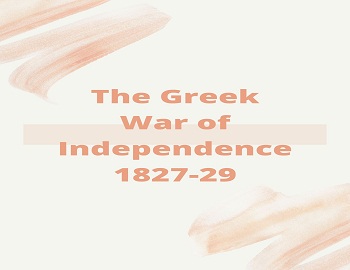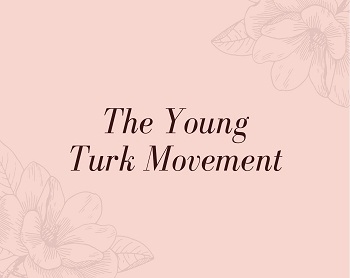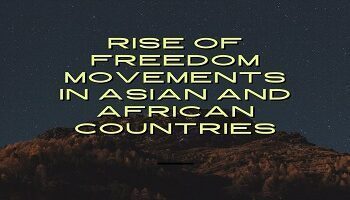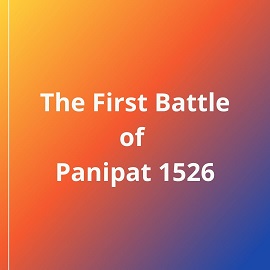The Greek War of Independence 1827-29:
The Greeks were the first to achieve their emancipation. Though forming part of the Ottoman Empire, the Greeks enjoyed a practical independence subject only to their sending to Constantinople an annual tribute in money and in sailors to man the imperial navy. The memories of Hellenic culture also contributed to the independence of the Greeks. In Greece, a linguistic and literary revival associated with the name of Korais heralded a national uprising. Moreover, ideas of liberty and nationality propagated by the French Revolution helped the awakening of the Greeks. Secret societies like Philike Hetaireia (Association of Friends) multiplied. Organized at Odessa in 1814 this society by 1820 enrolled 200,000 members. It aimed at the expulsion of the Turks from Europe and the re-establishment of the Greek empire.
In 1821, Prince Alexander Ypsilanti revolted in the Romanian principalities of Wallachia and Moldavia. He had counted on Russian and Romanian support. In this expectation, he was disappointed by both the powers. His force was defeated by the Turks in June 1821. Ypsilanti fled to Hungary where he remained a prisoner until his death in 1828.
Yet Ypsilanti’s abortive rising had sparked a revolt in Morea and in the Greek islands where it rapidly developed into a War of Independence. The Greek War of Independence forms an important chapter in the history of Europe in the 19th century. Begun in 1821 the war lasted till 1830 when the Greeks achieved their independence. From 1821-27, the Greeks fought alone against the Turks. This period was followed by foreign intervention. The war was fought with great ferocity on both sides. The Greeks attempted to make it a war of extermination. In revenge, the Turks hanged the Patriarch of Constantinople, the head of the Greek Church, in his robes in front of the Cathedral on Easter-day (April 22, 1821). Russia was excited by the execution of the Patriarch and it was feared that she would at once attack Turkey. Austria and England at once took measures to prevent this danger. For the moment the struggle was localized.
In 1822, Turks slaughtered over 20,000 Greeks in Chios and almost recaptured control of the peninsula. But the Greeks had command of the sea and the Turks had other troubles to contend with in Syria and in Persia. In January 1822 the Greeks declared their independence and promulgated a constitution. The Sultan of Turkey appealed for aid to Mehmet Ali, Pasha of Egypt who was promised the principalities of Syria, Damascus and Morea as the price of his assistance. Mehmet Ali sent his son Ibrahim and a disciplined army to Morea. The Greeks cause appeared to be hopeless when Russia intervened. In 1825 Tsar Alexander, reluctant to intervene, was succeeded by Nicholas I, more interested in Balkan possibilities. Everywhere- in France, Germany, England and Switzerland- Phihellenic Societies were formed.
Canning, the British Foreign Minister, decided to act lest Russia might gain dominance in the Balkans. In April 1826 an agreement between Britain and Russia was reached in the Protocol of Petersburg. According to the Protocol Greece was to remain tributary to the Sultan though she was to become virtually independent. Turkey rejected the Protocol. The French government indicated its approval of Anglo-Russian policy. In July 1827 by the Treaty of London, the three powers- Britain, Russia and France- agreed to compel the Sultan to accept their mediation and to recognize the autonomy of the Greeks. The Sultan again refused. The consequence was a naval battle at Navarino on October 20, 1827, a battle that arose accidentally but which ended in the destruction of the Turko-Egyptian fleet.
Meanwhile the new English ministry under Wellington, Canning have recently died, described the Battle of Navarino as an untoward incident. The result was the British withdrawal from the Greek question and allowing Russia a free hand. In 1828 Russia declared war against Turkey. After preliminary reverses, the Russian army reached Adrianople (September 1829). In 1830 Greek independence was ensured, its independence being guaranteed by Russia, France and Britain. In 1833 the new state became a monarchy in the person of Otto I, Prince of Bavaria. The Greek War of Independence was a heroic and epic struggle that fired the Balkan peoples with nationalist sentiment. This also gave a new turn in the foreign policy of Russia and the latter came to regard the Balkan question as more worthwhile than an occupation of the Turks capital.









Comments (No)